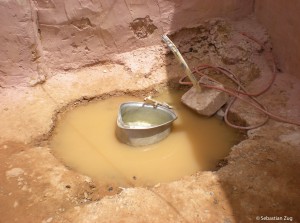Current research
Thesis Title : Moral and interests. Water supply in peri-urban Khartoum
Summary
In my PhD project I reconstruct water supply in a peri-urban neighbourhood in Khartoum. Water is delivered by a malfunctioning water network, informal water vendors and – to satisfy basic needs of all – redistributed among neighbours for free. In its ‘biography’, water is embedded into different contexts, which are never completely based on market mechanisms, but are always – to more or less degree – related to motives which are not based on economic profit. The different constellations in which water is transferred are analysed in the framework of Bourdieu’s ‘Theory of Practice’ which is confronted with people’s ethics as an antipode to Bourdieu’s focus on power and capital exchange.
Key Words
the gift of water, altruism, water solidarity, economy of symbolic goods, political ecology of water, infrastructure failure, appropriation of the network, Bourdieu, Sudan, Khartoum
Teaching
Université de Fribourg
Qualitative Methoden II
Analyse von Geodaten in der Humangeographie
Methoden der Humangeographie II
Publications
– 2011 (Draft): When Water Leaves the Market. Gifting and Social Redistribution of Water in Khartoum, Paper for ECAS 4, Uppsala 15-18.6.2011.
– 2010 (with D. Müller-Mahn, S. M. Abdalla and A.-S. Beckedorf): “Wasserversorgung und Stadtentwicklung in Khartum”,Geographische Rundschau, 62, 10, p.38-44.
– 2009 : “Wasser teilt die Städte Afrikas”, Universitas, Le Magazine de l’Université de Fribourg, March 2009, p.33-34.
– 2008 : The Impact of Agricultural Mechanisation on Poverty Alleviation in a Seasonal Environment: a Project Evaluation from Northern Bangladesh, IEE Working Papers, Volume 188, Bochum: Institut für Entwicklungsforschung und Entwicklungspolitik, 98 p.
– 2006 : “Monga – Seasonal Food Insecurity in Bangladesh – Bringing the Information Together”, in The Journal of Social Studies, No. 111 July-Sept 2006, p. 21-39.
– 2005 : “Das Holzkästchen. Ein komplexes kunsthandwerkliches Produkt unter dem Einfluss von Tourismus und Massenproduktion”, in Kemet 4/2005, p. 66-69.
